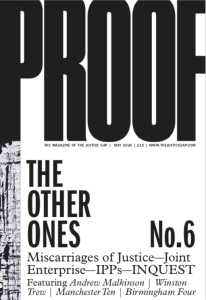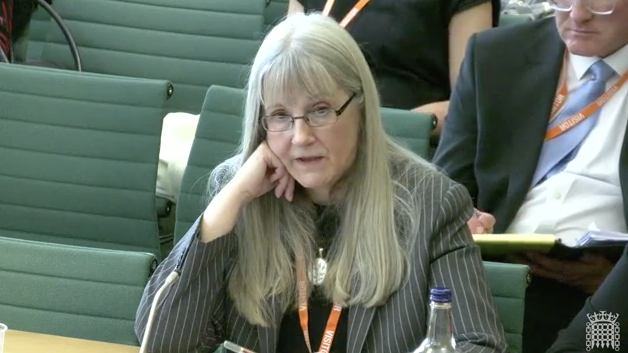‘Who is actually running the organisation?’ asked Andy Slaughter MP, chair of the House of Commons‘ justice committee, at a specially convened session on the work of the Criminal Cases Review Commission earlier this week. Sceptical MPs were grilling the watchdog’s chief executive, Karen Kneller and casework operations director, Amanda Pearce. Pearce had been at the CCRC since it opened its doors on April 1, 1997 and Kneller has been with the organisation for over 20 years and as its chief exec for 13 years.
 Since January this year, the CCRC has had no chair – the previous incumbent, Helen Pitcher having belatedly stepped down following months of hostile publicity over the commission‘s bungling of the Andrew Malkinson case and specifically her refusal to apologise.
Since January this year, the CCRC has had no chair – the previous incumbent, Helen Pitcher having belatedly stepped down following months of hostile publicity over the commission‘s bungling of the Andrew Malkinson case and specifically her refusal to apologise.
Andy Slaughter was ‘shocked’ at the CCRC’s remote working policy first introduced as a response to the pandemic and which mandates staff to be physically present at its Birmingham HQ for only 10 to 12 days in any year. ‘I can’t believe you’re the only organisation in the country that hasn’t come out of Covid yet,’ he quipped.
In a bruising session, we learned the following about the CCRC: its two most senior members of staff only come into the office ‘maybe one or two days every couple of months’; for almost two years the CCRC has had just nine commissioners despite being required by statute to have a minimum of 11; these commissioners, who are supposed to embody the independence of the CCRC, are on contracts for only 52 days a year; and the organisation was, in the words of committee member Sarah Russell MP, ‘profoundly understaffed’.
The reason for the CCRC’s controversial remote working scheme was apparently because it couldn’t find sufficient willing candidates to come to Birmingham for its case review manager posts. ‘The package we were offering was not good enough,’ Karen Kneller said. She also acknowledged that they ‘could probably do with another half dozen or so’ commissioners. The nine commissioners were doing one or two. days a week and equated to two-to-three full time posts. For an applicant to have their case referred, they need the backing of three commissioners.
 It is a dismal picture for applicants, as well as those with loved ones in prison, for whom the CCRC represents a last chance for justice.
It is a dismal picture for applicants, as well as those with loved ones in prison, for whom the CCRC represents a last chance for justice.
Ignoring the noise
But Karen Kneller and Amanda Pearce came to Westminster to reassure MPs that after a period of turbulence things had settled down. Last year the CCRC received 1,629 applications and the watchdog referred 25 cases to the Court of Appeal, i.e., fewer than 2%. It was back to business as normal. ‘It is really important to assure you that in terms of casework and applicants that has not been effected,’ the CCRC chief exec told the committee.
The MPs were sceptical from the off. ‘Are you seriously saying that the organisation is running as normal or better than it was?’ asked Andy Slaughter.
In terms of casework, the CCRC was ‘absolutely running very well’, Kneller insisted. There was ‘a period of upset and people were unsettled’, Kneller continued. ‘There was a lot of uncertainty and no one knew what was going on but the staff have really committed and doubled down.’ She said that ‘even with all the noise that is going on in the background’, their focus was on casework. ‘It would be easier if that noise was not there for sure and it would be easier if we had an interim chair in post but that is not within my gift.’
The Labour MP Pam Cox MP felt that the CCRC had ‘lost its way’ over the last 20 years. Kneller pushed back: ‘I would urge this committee and others to judge our performance across all of our casework – not only those cases which get into the headlines which is a tiny, tiny minority of our casework.’ That was ‘a challenge for us’. ‘Most applicants and those that are represented too by campaigners will be disappointed because in most cases, we are not finding a reason to refer that case back to the relevant appeal court.’
She continued: ‘In many cases it’s much harder to close a case and not to refer it than to make a referral. Closed cases can be ones that have had investigations for many months or even years. That is nuanced and difficult to get out into the media.’ Kneller has long resisted the notion that the CCRC should be judged on its referral rate (in the CCRC’s 2018 annual report Kneller bizarrely insisted that applicants were more concerned with waiting times than having their convictions overturned: here).
What needed to be done to repair the lack of public confidence, Cox wanted to know. The appointment of an interim chair to be ‘the ambassador and champion of the organisation’, said Kneller. ‘We don’t have that figurehead.’ Pearce called for legislative change ‘to allow us to speak more about the cases’. ‘One of the difficulties we face is that it is very difficult to counter a public narrative because there is a statutory restriction on what we can say about the cases we have investigated. So it is very easy to present a partial view of the case,’ she said; adding ‘that could go a long way to supporting confidence in the decisions that we make’.
In Helen Pitcher’s extraordinary resignation letter (in which she claimed to be ‘scapegoated’), Pitcher wrote the she had received ‘advice from departing commissioners to remove the senior management team’ (i.e., Kneller and Pearce). ‘This was not feasible,’ Pitcher wrote.
‘It felt a very strange thing to say in a resignation letter,’ Kneller told MPs. ’It was perhaps disappointing and upsetting to some members of staff that there was no reflection in that letter or thanks to case review staff who had been busting a gut on cases.’
It is understood that Pitcher actually had a good relationship with Kneller and Pearce (although, on the basis of the resignation letter, that clearly soured after the Malkinson controversy). MPs asked Kneller about attending an expensive business school in Fontainebleau where Pitcher held various positions (as reported by Emily Dugan in the Guardian); and two additional payments of £3,700 and £8,700 she received in 2022/23 and 2023/24 – she had not previously received any bonuses. Kneller said that she was ‘not privy to discussions’ as to why she received these one-off bonuses but said it might have been because of her oversight of a digital transformation program. The Lib Dem MP Tessa Munt MP noted the bonuses came on top of a 7.5% pay rise ‘a month before Andrew Makinson was exonerated’. ‘I’m amazed you and not curious about what it is you are being rewarded for,’ she added.
 A hole at the heart of the CCRC
A hole at the heart of the CCRC
Munt asked whether it was appropriate for her as chief exec to now apologise to Andrew Malkinson. ‘Absolutely, there is no doubt we got that case wrong. Mr. Malkinson was failed and we made mistakes in that case. We apologise and the organization apologises. The decisions around when we apologised would probably not be decisions we would make today. Everyone in the organization deeply regrets what happened on that case. I cannot begin to think of the impact that this has had on him. The double impact of serving a sentence, suffering a miscarriage of justice and the way we handled his case.’
Andy Slaughter concluded the session by observing that there was ‘a hole at the heart’ of the organisation. He returned to his concerns about the CCRC’s remote working policy. ‘If I went into your head office, I wouldn’t find any senior management there. I wouldn’t find any caseworkers there. I’m not sure that’s a good way to operate in any event,’ he said. ‘If I was your chief executive, I would be in every day. I would be asking my staff to be there. I’d be trying to rebuild the organisation so the commissioners and the board had a much more hands-on role. That does not seem to have happened at all.’
The MP found Kneller and Pearce’s defence of their running of the organisation ‘pretty half-hearted’ and ‘a reflection that things are going pretty well apart from one or two difficult cases’. ‘That leads me to ask: do you really think that you are the right people to leave this organisation forward?’
They did.
Support the Justice Gap, buy PROOF








